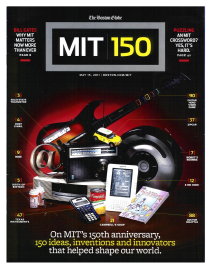Boston Globe Highlights 150 MIT Ideas, Innovators
The Boston Globe has highlighted 150 MIT ideas and innovators, including Zipcar, the spreadsheet, and E*Trade.
Topics

Here are some of the things on the list that have a specifically MIT Sloan connection, along with the Globe‘s commentary:
- Number 25: Executive branch. Alfred P. Sloan Jr., the chief executive of General Motors Co., had a problem. He saw many promising would-be executives in his company but didn’t know how to train them. So in the early 1930s, he came to MIT, his alma mater, and asked for help. MIT accepted the challenge and devised an experiment in executive education, inviting a small group of fellows from various companies to spend an intensive year of business and leadership training on campus. Now called the MIT Sloan Fellows Program in Innovation and Global Leadership, it has been copied elsewhere and many of its most famous graduates are on this list for their achievements in business.
- Number 37: Zipcar. Robin Chase, an entrepreneur trained at MIT’s Sloan School of Management, made not owning a car the club people wanted to join. Chase has moved on, but Zipcar, created in 2000, has grown to a fleet of 8,000 with 550,000 members in 60 cities.
- Number 39: Future of cars. If we ever see cars that get 100 miles per gallon, it will most likely be thanks to researchers at MIT’s Sloan Automotive Lab, an incubator for improvements in car engines for half a century. Under recent director John Heywood – called “the Yoda of cars” by some – researchers have developed a low-cost method for injecting small amounts of ethanol at crucial times into the engine to dramatically improve fuel performance – by 20 to 30 percent.
- Number 45: E*Trade. William A. Porter, who helped revolutionize digital stock trading with the founding of E*Trade, graduated from MIT’s Sloan Fellows Program.
- Number 128: Work in progress. In 1960, Douglas McGregor, a professor at the MIT Sloan School of Management, split corporate thought into two camps. Theory X held that employees were inherently disinclined to work and needed to be strictly controlled. Theory Y held that employees should be trusted and empowered.
